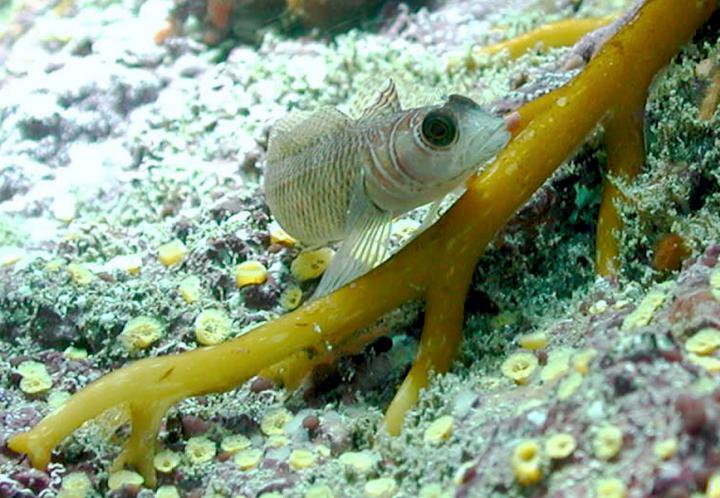
Credit: Sean D. Connell
Human-driven global change is challenging the scientific community to understand how marine species might adapt to predicted environmental conditions in the near-future (e.g. hypoxia, ocean warming, and ocean acidification). The effects of the uptake of anthropogenic atmospheric CO2 by oceans affects (i.e. ocean acidification) propagate across the biological hierarchy, from changes in the building blocks of life at nano-scales to organism, physiology and behaviour through ecosystem processes and their properties.
To survive in a reduced pH environment, marine organisms have to adjust their physiology which, at the molecular level, is achieved by modifying the expression of genes. The study of such changes in gene expression can aid in revealing the adaptive mechanisms of life under predicted future ocean acidification conditions.
Making use of natural laboratories
There are a few places on this planet where volcanic activity has CO2 bubbling from the seafloor creating conditions that are similar to those predicted to occur across the oceans in the near-future. Such natural laboratories can then help us to understand what will happen to marine organisms in the future under an ocean acidification scenario. Therefore, researchers from Research Division for Ecology & Biodiversity of the University of Hong Kong (HKU) and Swire Institute of Marine Science, jointly with researchers from the University of Adelaide, travelled to a remote volcanic island of New Zealand called White Island. They collected samples from CO2 seeps and nearby locations, and analysed molecular data from a fish species (the Common triplefin) with ecological evidence of being successfully adapted to acidified environments at CO2 volcanic vents. The findings were published in a peer-reviewed open access journal Evolutionary Applications.
Studying evolutionary mechanism through species mutations
The study found a higher gene expression in gonads in fish living in the CO2 vents with reduced pH than those from control environments with ambient CO2 and pH conditions. Most of those genes were functionally involved in the maintenance of pH homeostasis, increased metabolism, and regulatory functions of downstream biological processes revealing important processes a fish needs to adjust to live in a lower pH environment. Interestingly, it was mainly the male fish with this expression signature hinting at reproductive consequences as males provide parental care of the nests.
When looking at the actual sequence of these genes and their genetic variation, the authors found evidence of a long-term process of natural selection. The genetic changes, which we call mutations, providing the fish with adaptive advantages for living in an acidified, are located in DNA sequences regulating the expression of the genes. These mutations in regulatory sequences would not impact the fitness of the individuals carrying them when living in an ambient pH environment, but these might allow fine-tuned physiological regulation in a reduced pH environment. Such standing genetic variation in DNA regulatory sequences could provide for the adaptive potential to near-future ocean acidification in fishes.
Moreover, the authors propose an evolutionary mechanism by means this adaptive potential to ocean acidification could be maintained in natural populations of fishes. Fish species tend to occur across wide geographical ranges with different pH. Thus, it is likely that similar to what happens in Common triplefins, the genetic variation allowing for life in slightly reduced or variable pH environments already exist within many fish populations. Highly dispersive larvae of fishes contribute to the flow of this genetic variation among the populations of a species. Hence, it might be expected that the genetic variation in regulatory sequences of gene expression efficiently adjusting the physiological responses to reduced pH will provide the raw material for adaptive natural selection in the near-future under increasing ocean acidification.
“The findings of this study imply that one of the more relevant things in terms of the capacity of the marine species to respond to future changes in their environmental conditions is their current genetic variation. Thus, the assessment of the levels of genetic diversity of different marine species is the most important, and we are currently working on it,” said Dr Natalia PETIT-MARTY, first author of the paper and Postdoctoral Fellow in the group led by Dr Celia SCHUNTER at Research Division for Ecology and Biodiversity & Swire Institute of Marine Science, HKU.
“We are very fortunate to get to visit these remote places providing us with a glimpse of how the oceans may look like in the future. To make sure our findings are applicable across different marine ecosystems, we also travelled to CO2 vents at tropical coral reefs in Papua New Guinea and rocky reefs in the Mediterranean Sea, and will continue our research on the adaptive potential of marine fishes to ocean acidification,” added Dr Celia SCHUNTER, Assistant Professor at Research Division for Ecology and & Swire Institute of Marine Science, HKU.
###
The complete study was first published in Evolutionary Applications on April 8th, 2021. N. Petit-Marty, I. Nagelkerken, S. D. Connell, and C. Schunter. (2021). Natural CO2 seeps reveal adaptive potential to ocean acidification in fish.
The research paper can be accessed from: https:/
Images download and captions: https:/
Media Contact
Casey To
[email protected]
Original Source
https:/
Related Journal Article
http://dx.




